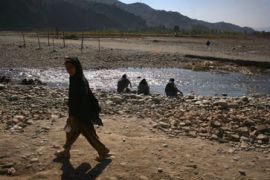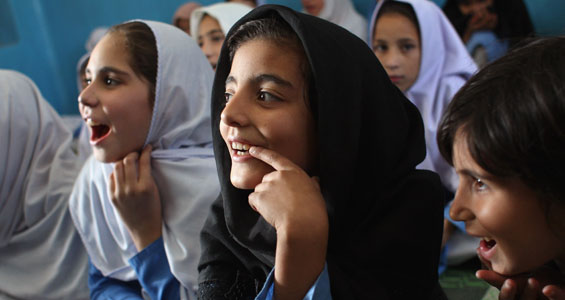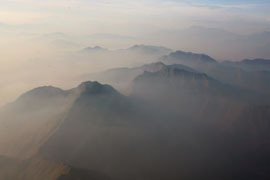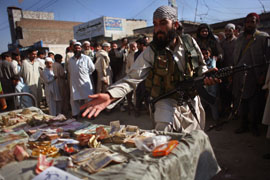Swat: Pakistan’s lost paradise
Resurgence of violence in the Swat valley has forced Islamabad to take action.

 |
| Girls attending school have been targeted by Maulana Fazalullah, a local cleric [GALLO/GETTY] |
Amid Barack Obama’s inauguration as US president, the war on Gaza and the aftermath of the Mumbai attacks, Pakistan’s media had until recently all but ignored the descent into hell of the Swat Valley in the North-West Frontier Province.
The valley has been transformed from a tourism magnet because of its alpine scenery into a valley stained with blood in recent months.
From banning female education and blowing up schools to the hanging of decapitated bodies in Mingora, the valley’s main town, the reign of terror spearheaded by Maulana Fazalullah, a radical cleric, defies description.
Until recently, the 11-month old government in Islamabad was virtually oblivious to the chain of events that question the very territorial integrity of the country.
Even the hyper-active local media was busy elsewhere: angling for the latest in the India-Pakistan stalemate, decoding what the incoming Obama administration held for Islamabad and the usual soap opera that passes for national politics.
No-go area
 |
| Swat valley was once a tourism magnet because of its alpine scenery [GALLO/GETTY] |
That all changed, however, after radicals delivered on their promise of blowing up schools if they were not shut down by a January 15 deadline.
Their actions have made a mockery of the government’s commitment a day earlier that the schools would reopen with its patronage and protection.
Only last week did the national parliament pass a resolution, rejecting the ban on female education and condemning the blowing up of schools.
On Saturday, the government decided to deploy troops to guard some institutions in Mingora.
But the belated measure to post 25 soldiers each at 16 locations is seen by many as an exercise in futility.
Swat today is a decidedly no-go area. Even Haji Adeel, a senator and senior leader of the Awami National Party, which heads the ruling coalition in the North-West Frontier province, pointed to the valley’s dire security situation.
He said: “Swat is a part of Pakistan but no governor, chief minister or the prime minister can venture to go there.”
The Pakistan army says armed groups have so far blown up or torched 165 schools for girls, 80 video shops, 22 barber shops and destroyed 20 bridges.
A devastating after-effect of the insurgency is that an estimated one million children in the Frontier province, which includes Swat, may have missed anti-polio vaccinations after the government exempted from its immunisation drive various settled areas it deemed too dangerous.
Kingdom of fear
Fazalullah’s attempts to enforce Islamic Sharia and an ongoing military operation launched by Pervez Musharraf, the former president, in 2007 have forced nearly a third of Swat’s 1.5 million people to migrate out of the province.
Taking advantage of the government’s deep engagement in the “war on terror” and Musharraf’s own protracted battle for survival in 2007, Fazalullah’s 10,000-strong private army established control over 5,337 square kilometres of territory.
The radical cleric uses FM radio to pass on his decrees to the local population. So effective is his grip on the valley, that the government’s influence is now largely confined to just 36 square kilometres of territory in and around Mingora.
Fazalullah runs a self-styled judiciary, which hears cases and hands down verdicts.
A treasury collects ushr (the Islamic practice of collecting one-tenth of agricultural produce). Last month, they also collected animal hides worth millions of rupees on Eid Al Adha, the Muslim festival of sacrifice.
His feared – and well-equipped – rebel army reportedly takes its cue from Tehrik-e-Taliban Pakistan, an extremist organisation headed by Baitullah Masud, the commander suspected of authoring the assassination of Benazir Bhutto, a former prime minister, in 2007.
The two came together in the aftermath of a sweeping military operation in 2007 at the Red Mosque in Islamabad that killed hundreds of seminary students and clerics who had defied the Musharraf regime for months.
Following up on their threat to avenge the killings, this alliance is said to be responsible for suicide bombings that killed dozens of security personnel.
The army, which has four brigades in Swat, says it is considering a new strategy to retrieve the situation by securing the main supply routes and reinforcing its strength in urban and rural centres.
However, skepticism abounds about how that will be achieved.
Scene from hell
Zubair Torwali, a social activist who lives in Swat, says the security forces fear patrolling the Swat valley.
“The police are escorted by the army personnel and come out of their hideouts for a couple of hours,” he said.
“One of the busiest squares, Grain Chowk, was renamed by shopkeepers as Khooni (bloody) Chowk because when they come to their shops in the morning, they find four or five bodies hung over the poles or trees. The bodies are usually headless.”
|
“The police are escorted by the army personnel and come out of their hideouts for a couple of hours” Zubair Torwali, a social activist |
A more chilling account of the prevailing fear is provided by Hamid Mir, a talk show host with Geo TV; Mir earned fame for his interview with Osama bin Laden in 2001.
Mir describes an episode in which a widow, who taught at a private school in Mingora, was warned by the extremists to stop coming out of her house, let alone teach.
Having no other means to feed her three children, she begged a religious scholar to intercede with the extremists, one of whom was a former student of the scholar.
However, the commander of the extremists was so annoyed that he had the scholar arrested immediately, before banishing him from Mingora.
Days later, the widow was executed by the extremists after being declared a prostitute.
At least three journalists – Sirajuddin, Azizuddin and Qari Shoaib – have also been killed while a sister of another, Sherinzada, perished in an attack on his house.
However, two other journalists, Hameedullah Khan and Musa Khankhel, have braved death to report on events in Swat.
Khan had his house dynamited by the local Taliban earlier this month and Khankhel has escaped two assassination attempts.
Khankhel has managed to earn the ire of both the security agencies and the extremists for his reporting.
The army has also been accused of indiscriminate fire resulting in the deaths of many innocents. It claims to have killed 784 extremists while losing 189 personnel since launching the military operation.
Mission impossible?
 |
| Faizullah’s army with its sophisticated weapons practically rules Swat [GALLO/GETTY] |
Syed Allauddin, a ruling Pakistan People’s Party MP from Swat who is unable to return to the region, believes there may be a three-pronged solution to the violence.
He suggests that Sharia be officially implemented followed by economic development and creation of job opportunities.
“But if I cannot enter my area how can I help my voters?” he said.
Caught between an indifferent government and ineffective army on the one hand and the extremists on the other, the people of Swat are, similarly, at a loss.
“The predicament of the people of Swat is worse than even of the people of Gaza. In Gaza, the enemy was well known but in Swat, the people don’t know who the enemy is and whom to hold responsible,” said Torwali.
The lack of faith is understandable, said Nasim Zehra, a security analyst based in Islamabad.
“Clearly, people in Swat have zero faith in the institutions of their own country. Can we blame them?”
Kamran Rehmat is News Editor at Dawn News, an independent Pakistani TV news channel.
The views expressed by the author are not necessarily those of Al Jazeera.